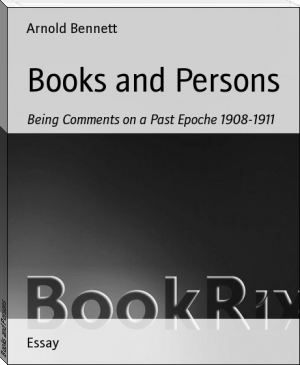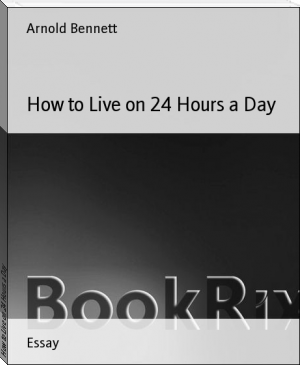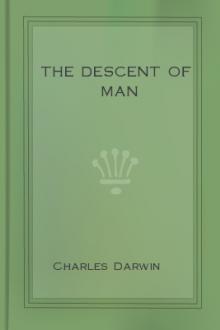Books and Persons - Arnold Bennett (phonics readers .TXT) 📗

- Author: Arnold Bennett
Book online «Books and Persons - Arnold Bennett (phonics readers .TXT) 📗». Author Arnold Bennett
under which he worked were too much for the artist in him. Mr. Baring admits these faults, but he does not sufficiently dwell on them. He glances at them and leaves them, with the result that the final impression given by his essay is apt to be a false one. Nobody, perhaps, ever understood and sympathized with human nature as Dostoievsky did. Indubitably nobody ever with the help of God and good luck ever swooped so high into tragic grandeur. But the man had fearful falls. He could not trust his wings. He is an adorable, a magnificent, and a profoundly sad figure in letters. He is anything you like. But he could not compass the calm and exquisite soft beauty of "On the Eve" or "A House of Gentlefolk."...
JOHN GALSWORTHY
[_14 July '10_]
Mr. John Galsworthy, whose volume of sketches, "A Motley," is now in process of being reviewed, is just finishing another novel, which will no doubt be published in the autumn. That novels have to be finished is the great disadvantage of the novelist's career--otherwise, as every one knows, a bed of roses, a velvet cushion, a hammock under a ripe pear-tree. To begin a novel is delightful. To finish it is the devil. Not because, on parting with his characters, the novelist's heart is torn by the grief which Thackeray described so characteristically. (The novelist who has put his back into a novel will be ready to kick the whole crowd of his characters down the front-door steps.) But because the strain of keeping a long book at the proper emotional level through page after page and chapter after chapter is simply appalling, and as the end approaches becomes almost intolerable. I have just finished a novel myself; my nineteenth, I think. So I know the rudiments of the experience. For those in peril on the sea, and for novelists finishing novels, prayers ought to be offered up.
In accordance with my habit of re-reading books which have uncommonly interested me on first perusal, I have recently read again "A Man of Property." Well, it stands the test. It is certainly the most perfect of Mr. Galsworthy's novels up to now. Except for the confused impression caused by the too rapid presentation of all the numerous members of the Forsyte family at the opening, it has practically no faults. In construction it is unlike any other novel that I know, but that is not to say it has no constructive design--as some critics have said. It is merely to say that it is original. There are no weak parts in the book, no places where the author has stopped to take his breath and wipe his brow. The tension is never relaxed. This is one of the two qualities without which a novel cannot be first class and great. The other is the quality of sound, harmonious design. Both qualities are exceedingly rare, and I do not know which is the rarer. In the actual material of the book, the finest quality is its extraordinary passionate cruelty towards the oppressors as distinguished from the oppressed. That oppressors should be treated with less sympathy than oppressed is contrary to my own notion of the ethics of creative art, but the result in Mr. Galsworthy's work is something very pleasing. Since "A Man of Property," the idea that the creator of the universe, or the Original Will, or whatever you like to call it or him, made a grotesque fundamental mistake in the conception of our particular planet, has apparently gained much ground in Mr. Galsworthy's mind. I hope that this ground may slowly be recovered by the opposite idea. Anyhow, the Forsyte is universal. We are all Forsytes, just as we are all Willoughby Patternes, and this incontrovertible statement implies inevitably that Mr. Galsworthy is a writer of the highest rank. I re-read "A Man of Property" immediately after re-reading Dostoievsky's "Crime and Punishment," and immediately before re-reading Bjoernson's "Arne." It ranks well with these European masterpieces.
SUPPRESSIONS IN "DE PROFUNDIS"
[_21 July '10_]
Some time ago I pointed out (what was to me a new discovery) that certain passages in the German translation of Oscar Wilde's "De Profundis" did not exist in the original English version as printed; and I suggested that Mr. Robert Ross, Oscar Wilde's faithful literary executor, should explain. He has been good enough to do so. He informs me that the passages in question were restored in the edition of "De Profundis" (the thirteenth) in Wilde's Complete Works, issued by Messrs. Methuen to a limited public, and that they have been retained in the fourteenth (separate) edition, of which Mr. Ross sends me a copy. I possessed only the first edition. I do not want to part with it, but the fourteenth is a great deal more interesting than the first. It contains a dedicatory letter by Mr. Ross to Dr. Max Meyerfeld ("But for you I do not think the book would ever have been published"), and some highly interesting letters written in Reading Gaol by Wilde to Mr. Ross (which had previously been published in Germany). In the course of this dedicatory letter, Mr. Ross says: "In sending copy to Messrs. Methuen (to whom alone I submitted it) I anticipated refusal, as though the work were my own. A very distinguished man of letters who acted as their reader advised, however, its acceptance, and urged, in view of the uncertainty of its reception, the excision of certain passages, to which I readily assented."
* * * * *
This explains clearly enough the motive for suppressing the passages. But even after making allowance for the natural timidity and apprehensiveness of the publishers' reader, I cannot quite understand why those particular passages were cut out. Here is one of them: "I had genius, a distinguished name, high social position, brilliancy, intellectual daring; I made art a philosophy and philosophy an art. I altered the minds of men and the colours of things; there was nothing I said or did that did not make people wonder. I took the drama, the most objective form known to art, and made it as personal a mode of expression as the lyric or sonnet; at the same time I widened its range and enriched its characteristics. Drama, novel, poem in prose, poem in rhyme, subtle or fantastic dialogue, whatever I touched I made beautiful in a new mode of beauty. To truth itself I gave what is false no less than what is true as its rightful province, and showed that the false and the true are merely forms of intellectual existence. I treated art as the supreme reality and life as a mere mode of fiction. I awoke the imagination of my century so that it created myth and legend around me. I summed up all systems in a phrase, and all existence in an epigram. Along with these things I had things that were different. But I let myself be lured into long spells of senseless and sensual ease." It is difficult to see anything in the factitious but delightful brilliance of this very characteristic swagger that could have endangered the book's reception.
* * * * *
Mr. Ross's letter to me concludes thus: "'De Profundis,' however, even in its present form, is only a fragment. The whole work could not be published in the lifetime of the present generation." This makes, within a month, the third toothsome dish as to which I have had the exasperating news that it is being reserved for that spoiled child, posterity. I may say, however, that I do not regard "De Profundis" as one of Wilde's best books. I was disappointed with it. It is too frequently insincere, and the occasion was not one for pose. And it has another fault. I happened to meet M. Henry Davray several times while he was translating the book into French. M. Davray's knowledge of English is profound, and I was accordingly somewhat disconcerted when one day, pointing to a sentence in the original, he asked, "What does that mean?" I thought, "Is Davray at last 'stumped'?" I examined the sentence with care, and then answered, "It doesn't mean anything." "I thought so," said M. Davray. We looked at each other. M. Davray was an old friend of Wilde's, and was one of the dozen men who attended his desolating funeral. And I was an enthusiastic admirer of Wilde's style at its best. We said no more. But a day or two later a similar incident happened, and yet another.
* * * * *
Wilde's letters to Mr. Ross from prison are extremely good. They begin sombrely, but after a time the wit lightens, and towards the end it is playing continually. The first gleam of it is this: "I am going to take up the study of German. Indeed prison seems to be the proper place for such a study." On the subject of the natural life, he says a thing which is exquisitely wise: "Stevenson's letters are most disappointing also. I see that romantic surroundings are the worst surroundings for a romantic writer. In Gower Street Stevenson would have written a new 'Trois Mousquetaires,' in Samoa he writes letters to the _Times_ about Germans. I see also the traces of a terrible strain to lead a natural life. To chop wood with any advantage to oneself or profit to others, one should not be able to describe the process. In point of fact the natural life is the unconscious life. Stevenson merely extended the sphere of the artificial by taking to digging. The whole dreary book has given me a lesson. If I spend my future life reading Baudelaire in a cafe I shall be leading a more natural life than if I take to hedger's work or plant cacao in mud-swamps."
HOLIDAY READING
[_4 Aug. '10_]
I came away for a holiday without any books, except one, and I cut off the whole of my supply of newspapers, except one. As a rule my baggage is most injurious to railway porters, and on the Continent very costly, because of the number of books and neckties it contains. I wear the neckties, but I never read the books. I am always meaning to read them, but something is always preventing me. Before starting, the awful thought harasses me: Supposing I wanted to read and I had naught! This time I decided that it would be agreeably perilous to run the risk. The unique book which I packed was the sixth volume of Montaigne in the Temple Classics edition. We are all aware, from the writings of Mr. A.B. Walkley, Sir William Robertson Nicoll, Mr. Hall Caine, and others, what a peerless companion is Montaigne; how in Montaigne there is a page to suit every mood; how the most diverse mentalities--the pious, the refined, the libertine, the philosophic, the egoistic, the altruistic, the merely silly--may find in him the food of sympathy. I knew I should be all right with Montaigne. I invariably read in bed of a night (unless paying in my temples the price of excess), and nobody who ever talked about bed-books has succeeded in leaving out Montaigne from his list. My luggage cost much
JOHN GALSWORTHY
[_14 July '10_]
Mr. John Galsworthy, whose volume of sketches, "A Motley," is now in process of being reviewed, is just finishing another novel, which will no doubt be published in the autumn. That novels have to be finished is the great disadvantage of the novelist's career--otherwise, as every one knows, a bed of roses, a velvet cushion, a hammock under a ripe pear-tree. To begin a novel is delightful. To finish it is the devil. Not because, on parting with his characters, the novelist's heart is torn by the grief which Thackeray described so characteristically. (The novelist who has put his back into a novel will be ready to kick the whole crowd of his characters down the front-door steps.) But because the strain of keeping a long book at the proper emotional level through page after page and chapter after chapter is simply appalling, and as the end approaches becomes almost intolerable. I have just finished a novel myself; my nineteenth, I think. So I know the rudiments of the experience. For those in peril on the sea, and for novelists finishing novels, prayers ought to be offered up.
In accordance with my habit of re-reading books which have uncommonly interested me on first perusal, I have recently read again "A Man of Property." Well, it stands the test. It is certainly the most perfect of Mr. Galsworthy's novels up to now. Except for the confused impression caused by the too rapid presentation of all the numerous members of the Forsyte family at the opening, it has practically no faults. In construction it is unlike any other novel that I know, but that is not to say it has no constructive design--as some critics have said. It is merely to say that it is original. There are no weak parts in the book, no places where the author has stopped to take his breath and wipe his brow. The tension is never relaxed. This is one of the two qualities without which a novel cannot be first class and great. The other is the quality of sound, harmonious design. Both qualities are exceedingly rare, and I do not know which is the rarer. In the actual material of the book, the finest quality is its extraordinary passionate cruelty towards the oppressors as distinguished from the oppressed. That oppressors should be treated with less sympathy than oppressed is contrary to my own notion of the ethics of creative art, but the result in Mr. Galsworthy's work is something very pleasing. Since "A Man of Property," the idea that the creator of the universe, or the Original Will, or whatever you like to call it or him, made a grotesque fundamental mistake in the conception of our particular planet, has apparently gained much ground in Mr. Galsworthy's mind. I hope that this ground may slowly be recovered by the opposite idea. Anyhow, the Forsyte is universal. We are all Forsytes, just as we are all Willoughby Patternes, and this incontrovertible statement implies inevitably that Mr. Galsworthy is a writer of the highest rank. I re-read "A Man of Property" immediately after re-reading Dostoievsky's "Crime and Punishment," and immediately before re-reading Bjoernson's "Arne." It ranks well with these European masterpieces.
SUPPRESSIONS IN "DE PROFUNDIS"
[_21 July '10_]
Some time ago I pointed out (what was to me a new discovery) that certain passages in the German translation of Oscar Wilde's "De Profundis" did not exist in the original English version as printed; and I suggested that Mr. Robert Ross, Oscar Wilde's faithful literary executor, should explain. He has been good enough to do so. He informs me that the passages in question were restored in the edition of "De Profundis" (the thirteenth) in Wilde's Complete Works, issued by Messrs. Methuen to a limited public, and that they have been retained in the fourteenth (separate) edition, of which Mr. Ross sends me a copy. I possessed only the first edition. I do not want to part with it, but the fourteenth is a great deal more interesting than the first. It contains a dedicatory letter by Mr. Ross to Dr. Max Meyerfeld ("But for you I do not think the book would ever have been published"), and some highly interesting letters written in Reading Gaol by Wilde to Mr. Ross (which had previously been published in Germany). In the course of this dedicatory letter, Mr. Ross says: "In sending copy to Messrs. Methuen (to whom alone I submitted it) I anticipated refusal, as though the work were my own. A very distinguished man of letters who acted as their reader advised, however, its acceptance, and urged, in view of the uncertainty of its reception, the excision of certain passages, to which I readily assented."
* * * * *
This explains clearly enough the motive for suppressing the passages. But even after making allowance for the natural timidity and apprehensiveness of the publishers' reader, I cannot quite understand why those particular passages were cut out. Here is one of them: "I had genius, a distinguished name, high social position, brilliancy, intellectual daring; I made art a philosophy and philosophy an art. I altered the minds of men and the colours of things; there was nothing I said or did that did not make people wonder. I took the drama, the most objective form known to art, and made it as personal a mode of expression as the lyric or sonnet; at the same time I widened its range and enriched its characteristics. Drama, novel, poem in prose, poem in rhyme, subtle or fantastic dialogue, whatever I touched I made beautiful in a new mode of beauty. To truth itself I gave what is false no less than what is true as its rightful province, and showed that the false and the true are merely forms of intellectual existence. I treated art as the supreme reality and life as a mere mode of fiction. I awoke the imagination of my century so that it created myth and legend around me. I summed up all systems in a phrase, and all existence in an epigram. Along with these things I had things that were different. But I let myself be lured into long spells of senseless and sensual ease." It is difficult to see anything in the factitious but delightful brilliance of this very characteristic swagger that could have endangered the book's reception.
* * * * *
Mr. Ross's letter to me concludes thus: "'De Profundis,' however, even in its present form, is only a fragment. The whole work could not be published in the lifetime of the present generation." This makes, within a month, the third toothsome dish as to which I have had the exasperating news that it is being reserved for that spoiled child, posterity. I may say, however, that I do not regard "De Profundis" as one of Wilde's best books. I was disappointed with it. It is too frequently insincere, and the occasion was not one for pose. And it has another fault. I happened to meet M. Henry Davray several times while he was translating the book into French. M. Davray's knowledge of English is profound, and I was accordingly somewhat disconcerted when one day, pointing to a sentence in the original, he asked, "What does that mean?" I thought, "Is Davray at last 'stumped'?" I examined the sentence with care, and then answered, "It doesn't mean anything." "I thought so," said M. Davray. We looked at each other. M. Davray was an old friend of Wilde's, and was one of the dozen men who attended his desolating funeral. And I was an enthusiastic admirer of Wilde's style at its best. We said no more. But a day or two later a similar incident happened, and yet another.
* * * * *
Wilde's letters to Mr. Ross from prison are extremely good. They begin sombrely, but after a time the wit lightens, and towards the end it is playing continually. The first gleam of it is this: "I am going to take up the study of German. Indeed prison seems to be the proper place for such a study." On the subject of the natural life, he says a thing which is exquisitely wise: "Stevenson's letters are most disappointing also. I see that romantic surroundings are the worst surroundings for a romantic writer. In Gower Street Stevenson would have written a new 'Trois Mousquetaires,' in Samoa he writes letters to the _Times_ about Germans. I see also the traces of a terrible strain to lead a natural life. To chop wood with any advantage to oneself or profit to others, one should not be able to describe the process. In point of fact the natural life is the unconscious life. Stevenson merely extended the sphere of the artificial by taking to digging. The whole dreary book has given me a lesson. If I spend my future life reading Baudelaire in a cafe I shall be leading a more natural life than if I take to hedger's work or plant cacao in mud-swamps."
HOLIDAY READING
[_4 Aug. '10_]
I came away for a holiday without any books, except one, and I cut off the whole of my supply of newspapers, except one. As a rule my baggage is most injurious to railway porters, and on the Continent very costly, because of the number of books and neckties it contains. I wear the neckties, but I never read the books. I am always meaning to read them, but something is always preventing me. Before starting, the awful thought harasses me: Supposing I wanted to read and I had naught! This time I decided that it would be agreeably perilous to run the risk. The unique book which I packed was the sixth volume of Montaigne in the Temple Classics edition. We are all aware, from the writings of Mr. A.B. Walkley, Sir William Robertson Nicoll, Mr. Hall Caine, and others, what a peerless companion is Montaigne; how in Montaigne there is a page to suit every mood; how the most diverse mentalities--the pious, the refined, the libertine, the philosophic, the egoistic, the altruistic, the merely silly--may find in him the food of sympathy. I knew I should be all right with Montaigne. I invariably read in bed of a night (unless paying in my temples the price of excess), and nobody who ever talked about bed-books has succeeded in leaving out Montaigne from his list. My luggage cost much
Free e-book «Books and Persons - Arnold Bennett (phonics readers .TXT) 📗» - read online now
Similar e-books:





Comments (0)